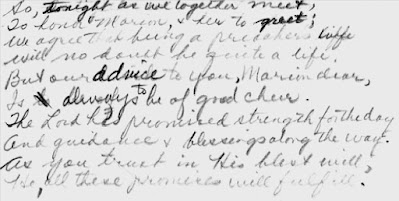Have you listened this morning to the sounds you hear, including the background noises and what they tell you, and do you wonder what other sounds are out there? Frinstance, what sounds would be added if the cars going by on the road did not have mufflers to attenuate certain supposedly bad sounds? Now imagine the loss to the person who has a muffler that suppresses the good sounds?
After I got this new set of hearing aids I noticed something that I had never been aware of before, that music is now more within reach. Not sure how to explain it, but on looking back over my lifetime and exposure to music it makes me wonder whether my hearing has been lacking right from the beginning. What I mean is that I must not have been able to hear the full range of tones, including overtones, and thus not able to produce them. No wonder they told me to move my lips only without voice when singing.I have never thought of myself as being tone deaf, for the difference in tone and pitch has always been evident, certainly in the lower ranges if not in the higher ones. And now I am sure that I never ever was able to hear the higher ones. For example Muriel was always bothered by very high frequency sounds that were not there for me, and I can remember from very early years my mother being the same way while I was unaware of what bothered her.
However, when I first got (good) hearing aids six years ago I discovered that when the higher ranges were amplified so that they were equal, for me, to the lower ranges that it improved my toleration for the "noisy" singing on Sunday mornings. The conclusion that I have come to may not be provable, but it seems logical to me that the human ear does do some adjustments on its own to adapt to the occasion so that the hearing sense gets sensations closer to what it expects. That means in a noisy atmosphere the sensations from all sounds, especially the loud ones, are somewhat tuned out, and in a quiet place they are sensed more acutely. Moreover the ear or hearing sense will amplify the sounds to try to get what the brain or memory expects if it has some idea of what to expect. Now, I have considered myself quite able to appreciate the tonal range and melodic qualities of music. You have to be able to do this to appreciate the extreme ranges of operatic or baroque composers, which I do.
Perhaps this explanation helps to understand why there are people who place tempo and beat above melodic qualities. Perhaps their ears are not sensing the full range. So when I realized that what used to be almost a painful experience to hear a "noisy" worship band had become tolerable I realized something was different. Before I had hearing aids, my natural hearing amplification was boosting the whole sound spectrum equally, including the lows that were already too loud, and the highs which were only imagined. The tuned mechanical aids amplified only the higher notes that I was listening for but was unable to hear, making a more balanced and agreeable atmosphere. Therefore there was no discomfort and it was not necessary to plan to arrive late to the service after the "noise" was finished. In retrospect the same thing was happening when the sound operator turned up the volume to make the speaker more understandable, for it seemed he boosted the bass frequencies more than the higher ones. That may be helpful for people who have lost the ability to hear low tones, but it did not help me.
When I asked the man who fitted the new hearing aid what improvements had been made in the last few years he explained one new feature that intrigued me. It was in relation to how it could handle high tones, even tones that were probably never within my hearing range, but nevertheless real life tones that were used in music and contributed to the melodic and overtone effects. I'm sure his explanation was not very full, for it left me wondering how a hearing aid could translate a sound too high for me to ever have heard into something that would be complementary and pleasing. But I really believe that is what they do, for it seems now that I have more of an ear for music and expect to really hear what had before been only imaginary. It may be just imagination, but now when I am singing I can hear my own voice well enough to tell when I am in tune. Who knows if another Beethoven was lost because the child was not diagnosed with hearing loss? Not a tin ear, but a leaden one.
Dad
